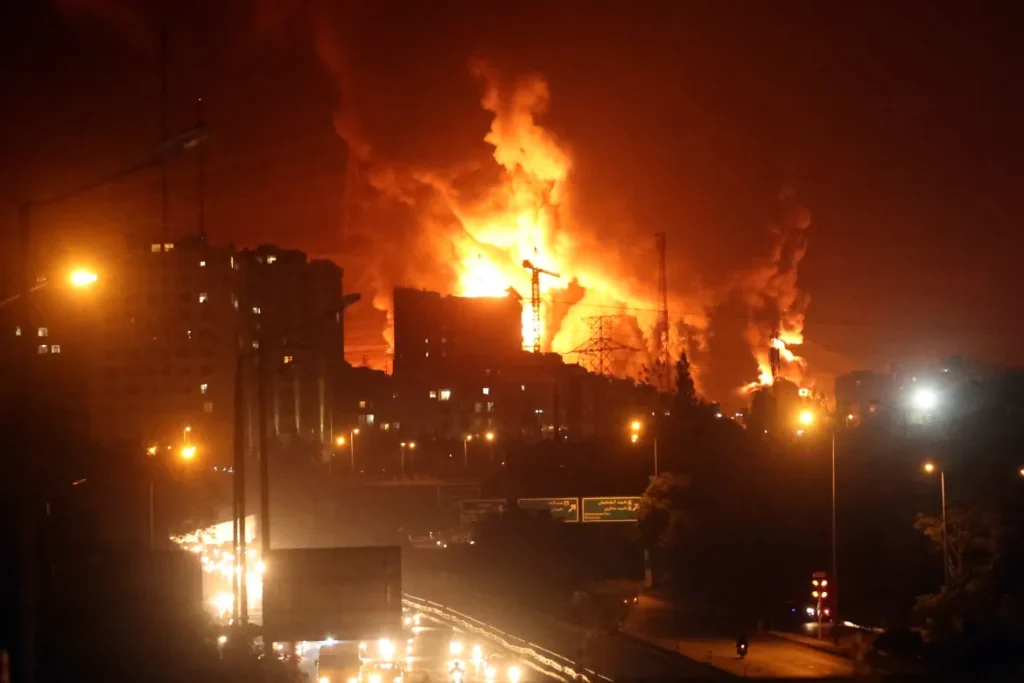Tensions between Iran and Israel have exploded into open warfare, with escalating missile and drone attacks resulting in hundreds of deaths, widespread destruction, and growing international alarm.
According to official reports, Iran launched fresh ballistic missile and drone strikes on Israel early Monday, targeting strategic infrastructure while explosions echoed across Iran’s capital, Tehran. The attacks have triggered an alarming rise in casualties, with no end in sight.
Heavy Toll on Civilians
At least eight more Israelis were killed, bringing the country’s death toll to 24, with over 380 wounded. Israel’s oil refineries and power grid have also been hit, deepening the humanitarian and economic strain.
Iran, meanwhile, has suffered even more devastating consequences. Its health ministry confirmed 224 deaths and 1,481 injured from ongoing Israeli strikes, including missile hits in key Tehran districts such as Niavaran, Tajrish, Valiasr, and Hafte Tir.
A 9am News report confirms that residential areas and military sites in both countries have been severely damaged. In one of the most significant strikes, Iran’s Islamic Revolutionary Guard Corps (IRGC) intelligence chief, Mohammad Kazemi, and two senior officers were reportedly killed.
The Iranian government claims 70 women and children died, with many more buried under rubble, sparking outcries over civilian safety and the legitimacy of targeted strikes.
Iran’s Foreign Ministry accused Israel of spreading misinformation, stating that claims of “surgical, precise strikes” were false.
“Israel is targeting civilian zones,” said spokesman Esmaeil Baqaei, calling the narrative misleading and dangerous.
The war erupted last Friday when Israel launched a pre-emptive attack on Iranian military and nuclear infrastructure two days before scheduled US-Iran nuclear talks. Iran has since suspended the negotiations, claiming any dialogue is now “unjustifiable.”
Israeli Prime Minister Benjamin Netanyahu, in a national address, vowed to strike every “target of the Ayatollah’s regime,” signalling that Israel’s military strategy may be aimed at regime change.
Citing The New York Times, experts believe Israel is strategically crippling Iran’s economy and security infrastructure, potentially to weaken the regime’s hold and provoke internal dissent.
Military analysts note that Iran’s energy facilities, manufacturing hubs, and aviation sectors have all come under sustained Israeli bombardment since Saturday.
Iranian Foreign Minister Seyed Abbas Araghchi warned that Tehran does not wish for a regional war, but said one would be “imposed” if necessary.
On the international front, former US President Donald Trump revealed that the US might intervene, noting that he recently spoke with Russia’s President Vladimir Putin, who offered to mediate.
“Putin called me. We had a long talk. He’s ready,” Trump told ABC News, adding that the US remains open to a diplomatic solution but hinted that military involvement could be on the table.
Meanwhile, Oman, which was set to host the sixth round of US-Iran nuclear talks, confirmed the event had been cancelled.
As casualties climb and peace efforts stall, world leaders have renewed calls for de-escalation. However, with both Iran and Israel firmly entrenched in military retaliation and nationalistic rhetoric, the prospects of peace remain distant.
The 9am News report underscores the danger of continued conflict, which risks pulling the wider Middle East and possibly global powers into a deeper crisis.
Stay tuned to 9am News Nigeria for more Breaking News, Business News, Sports updates And Entertainment Gists.
















